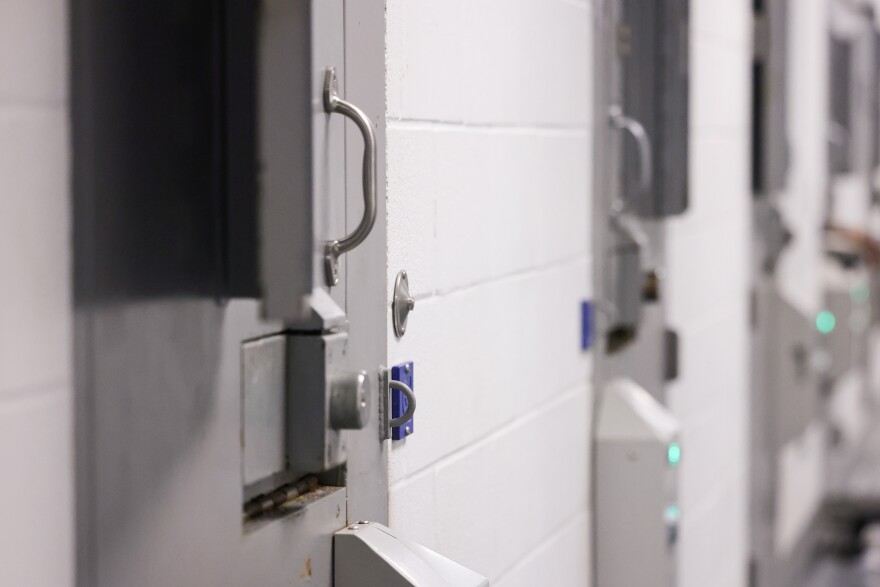This story discusses suicidal thoughts. For resources and support, call 988 to reach the Suicide and Crisis Lifeline, or text HOME to 741741 to connect to the Crisis Text Line.
In 2020, Chasity Congious gave birth unattended in her Tarrant County Jail cell, leading to a federal lawsuit and public outcry over her treatment.
Last week, after Congious experienced a mental health crisis, Fort Worth police brought her back to jail, according to her mother and law enforcement.
Congious has intellectual disabilities and suffers from mental illness, her mother, Kimberly Hammond, told KERA News. On April 1, Congious expressed thoughts of suicide, and someone with her at the time called police for help, Hammond said.
When police arrived, they realized Congious had an arrest warrant for probation violations and brought her to jail, Fort Worth police confirmed Tuesday.
The officers should have taken care of Congious’ mental health crisis before thinking about jail, Hammond said.
"Yeah, she has a warrant, but she's very much still special needs,” Hammond said.
Police have the option to take someone to the hospital instead of jail during a mental health crisis, but their decision isn’t based on the nature of the call alone, police spokesperson Officer Daniel Segura told KERA News.
"They assessed the situation, and based on what they saw and what the person told them, the decision was made to take that person to jail and not the hospital," he said of Congious’ arrest.
Congious’ incarceration lasted from her booking on April 1 to April 3, after a judge ordered her released, court documents show. Tarrant County prosecutors also threw out their motion to pursue her for violating probation.
“The petition to revoke her probation was dismissed. Her probation has expired,” District Attorney’s office spokesperson Anna Tinsley Williams wrote in an email Tuesday.
Congious’ legal troubles began in 2019, when she was charged with injury to a child, elderly or disabled person. That case stemmed from a fight with a family member, Hammond said.
Congious pleaded guilty, and the court placed her on four years of probation, court documents show.
In 2020, Congious was charged with assault on a family member, which violated her probation. Congious’ family called police, seeking to have her brought to John Peter Smith Hospital, but she was arrested, according to the federal lawsuit Hammond has filed against FWPD and the Tarrant County Sheriff’s Office.
While incarcerated, Congious gave birth to her daughter Zenorah in her cell, alone. Zenorah died 10 days later.
A month after the birth, a psychological evaluation concluded Congious was incompetent to stand trial, and prosecutors dismissed her assault charge. Her probation for the 2019 charge continued, court documents show.
The death of her daughter set Congious back mentally, Hammond said. She’s not as independent as she once was, and Hammond bought her two baby dolls to diminish some of her anxiety.
“There are daily struggles,” Hammond said. “She tends to have a significant amount of triggers due to the loss of the baby.”
In early December 2023, prosecutors filed a motion to go after Congious for probation violations again. Congious did not report to her supervision officer in four separate months, did not provide a urine sample on one occasion, did not complete her community service hours or pay her supervision fees, according to the Tarrant County Criminal District Attorney’s Office.
Congious could not always report because she was in and out of psychiatric hospitals, Hammond said. As for the community service hours, Congious would not be stable enough to complete them, she added.
Those violations led to Congious’ latest incarceration last week.
It’s unclear what will happen next in Congious’ case. Online court records show the case is still open.
Executive Chief Deputy Charles Eckert, who’s in charge of the day-to-day operations of the Tarrant County Jail, said he worked with the DA's office and the judge to get Congious released once the order came down.
"We really don't have any control who comes to our jail,” Eckert said. “And when they get released, we just follow the orders of the judges."
Like all people booked into the jail, Congious underwent a mental health screening, and My Health My Resources of Tarrant County (MHMR), the agency in charge of mental health care in the jail, was aware of Congious’ incarceration, Eckert said. MHMR personnel recommended Congious be housed in a single person cell and met with her before release to make sure she was well, he said.
Eckert didn’t learn Congious was back in his facility until April 3, he said. Thousands of people are in Tarrant County custody each day.
“I would have loved to have known personally, but I mean, that many people, and that many officers that work here, we don't really think that much about it," he said.
Hammond’s lawsuit over the birth and death of Zenorah is in settlement talks, according to court records.
The lawsuit alleges jail staff knew Congious would not be able to express her symptoms or recognize when she was going into labor. It also states Congious banged on the door of her cell for help, and no one responded.
The Sheriff’s Office maintains that Congious did not make a sound during labor and that jail staff were nearby.
The attorney representing Congious in the lawsuit, Jarrett Adams, criticized the entire Tarrant County justice system for Congious’ latest arrest.
“The problem is this: Tarrant County acts as if mentally ill people are invisible down there, and a burden,” he said.
Got a tip? Email Miranda Suarez at msuarez@kera.org. You can follow Miranda on X @MirandaRSuarez.
KERA News is made possible through the generosity of our members. If you find this reporting valuable, consider making a tax-deductible gift today. Thank you.





